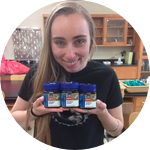About This Project
Since settlers brought honeybees to New Zealand, inhabitants have utilized honey produced from the native Manuka tree as an antiseptic to treat gastrointestinal and wound infections. Today, deadly infections with antibiotic-resistant bacteria are becoming a major health concern. Manuka Honey alone is known to kill bacteria. We plan to test Manuka Honey and a specific compound in it, MGO, alongside existing drugs to attempt to restore sensitivity to those drugs to combat the issue of resistance.
Ask the Scientists
Join The DiscussionWhat is the context of this research?
The over use of antibiotics paired with the lack of research to identify new antibiotic compounds, many strains of bacteria are no longer susceptible to current drug treatments. Resistance across nearly all classes of antibiotics has been seen within the last decade. The growing number of antibiotic-resistant bacterial infections is cause for serious concern. The CDC reported in 2013 that drug-resistant microbes caused over 2 million illnesses and 23,000 deaths. Methicillin-resistant Staphylococcus aureus, or MRSA, is one of the most prominent strains that is highly resistant to drugs. In an effort to combat MRSA and other deadly antibiotic-resistant bacterial strains, we are investigating at a natural solution in manuka honey.
What is the significance of this project?
Our project focuses on pairing modern antibiotics with low doses of Manuka Honey to increase antibiotic effectiveness. We are also combining methyl glyoxal (MGO), the active antibacterial ingredient in Manuka Honey, with antibiotics. In our preliminary experiments, we found that treatment with low-doses of MGO made bacteria 3 times more sensitive to tetracycline, a commonly prescribed antibiotic. This preliminary data is extremely promising. The results demonstrate MGO as a potential synergistic compound with antibiotics, which could be utilized in the treatment of resistant infections down the road.
What are the goals of the project?
We would like to publish our findings before I complete my bachelor's degree in May of 2016. To do so, we must add support to our preliminary study by tracking the growth of the bacterial broth cultures containing the drugs, manuka honey, and MGO over time. This will be done with the Biology Departments plate reader. These temporal experiments will help us to better understand Manuka Honey's lethal mode of action. We will also expand our studies from nonresistant ATCC strains of Staphylococcus aureus to include methicillin and vancomycin-resistant strains of Staphylococcus aureus.
Budget
My original stock of Manuka Honey is running low. I need to replenish this reagent, as it is the primary focus of my study. I also intend to investigate the antimicrobial properties of methylglyoxal, one of the proposed active compounds found in Manuka Honey. I will purchase a small amount of purified methylglyoxal for this study.
I have access to a stock of general laboratory supplies, but my project will require some specialized microbiology items. Consumable laboratory supplies for this project include Petri dishes, bacterial culture tubes, bacterial culture plates, and serological pipettes.
In order for my data to be comparable to other published studies, I need to be very careful to use bacterial growth medium that is a standard in the field. This medium is called Mueller Hinton II medium. My project will require both broth and agar preparations of Mueller Hinton II medium. Having access to this specific medium will put me on track to publish my findings in a peer-reviewed journal.
Meet the Team
Team Bio
I am a senior undergraduate student at HPU pursuing a major in biology and a minor in statistics. I'm from Asheville, NC: the hippie haven of the South. Because of my hometown's influence on my character, I am always looking for a balance between my granola side and my biology major side. This project achieves that balance because it utilizes a natural compound as a tool to battle antibiotic resistance.
Project Backers
- 30Backers
- 101%Funded
- $1,361Total Donations
- $45.37Average Donation
